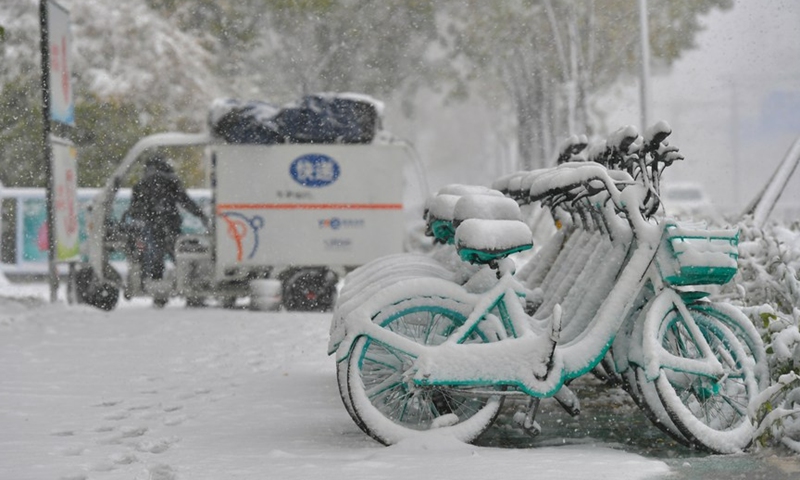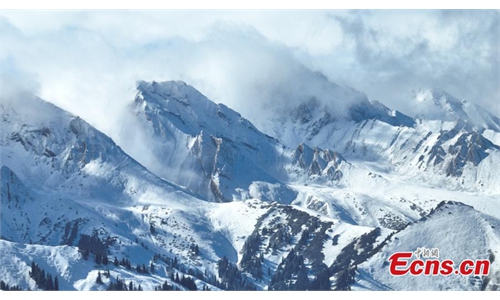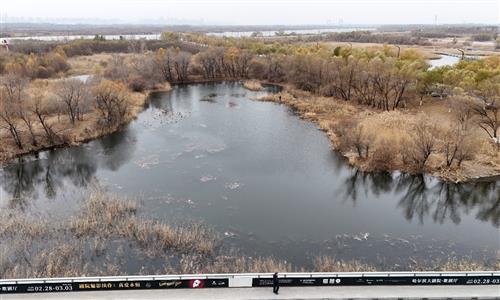Meteorological authority releases three warnings; schools in NE China’s Harbin suspend classes due to blizzard

Snow covers bikes during the first large-scale snowfall of the season in Shenyang, Northeast China's Liaoning Province, on November 6, 2023. Photo: Xinhua
The Chinese National Meteorological Centre (NMC) maintained an orange warning for snowstorms, a blue warning for a cold wave, and a blue warning for strong winds at 6 am on Monday, while schools in the six main districts in Harbin city, Northeast China's Heilongjiang Province, suspended classes on the same day due to a heavy snowfall.
According to the NMC, from 8 am Monday to 8 am Tuesday, there will be heavy to blizzard-level snowfall in some areas of North China's Inner Mongolia Autonomous Region, as well as Northeast China's Heilongjiang, Jilin, and Liaoning provinces. The above-mentioned areas will see a new snow accumulation depth of 10 to 20 centimeters, with some areas reaching more than 30 centimeters.
The heavy snowfall in Northeast China entered its strongest period on Monday, with local snowfall likely to break historical records for the same period.
"The snow is falling heavily, and it feels extremely cold. The snow on the ground is also very thick, so the school needs to use a bulldozer to clear the snow," a university student studying in Heilongjiang Province told the Global Times on Monday.
He added that strong winds were creating snowdrifts, affecting visibility. "This blizzard has made it difficult for us to walk on the roads," he said.
The blizzard was mainly caused by the convergence of cold and warm air, with the strong warm and humid air carrying a large amount of water vapor from the Bohai Sea and the Yellow Sea to the northeast region, resulting in significant precipitation, said Dong Quan, chief forecaster of the NMC. "With the decrease in temperature, the precipitation changed from rain to snow, leading to heavy snowfall in some areas," Dong said.
According to the Weather China website, the public should be vigilant about the adverse effects of heavy snowfall on production and daily life, and the elderly, children, and individuals with weaker physical constitutions should try to limit their outdoor activity.
Due to the weather conditions, corresponding measures have been implemented in various regions.
The Harbin Education Bureau issued a notice stating that primary and secondary schools, kindergartens, and off-campus training institutions in the six main districts in Harbin city would suspend classes on Monday.
The Liaoning Port Group canceled five passenger routes from Dalian, Liaoning Province, to Yantai, Weihai in East China's Shandong Province on Monday. It is expected that as the wind weakens during the night, maritime passenger transport schedules will gradually return to normal.
Apart from the northeast region, the cold wave also affected North China and South China.
According to the meteorological consultation results, the northern region has experienced consecutive temperature drops in recent days. In order to ensure the warmth of residents during winter, Beijing and Tianjin started central heating from midnight on Monday, according to media reports.
The temperature in some southern regions has also witnessed a significant drop. Many places in the middle and lower reaches of the Yangtze River were still warm on Sunday, however, with the arrival of cold air on Monday, temperatures in many southern areas plummeted sharply, according to the Weather China website.
According to media reports on Monday, as the weather gradually gets colder, the wholesale volume of down jackets has been increasing every day, and it is expected to soon usher in a sales peak. In addition to high sales at physical stores, gloves, insulated cups, and thermal underwear from multiple brands are also seeing hot sales on e-commerce platforms.



